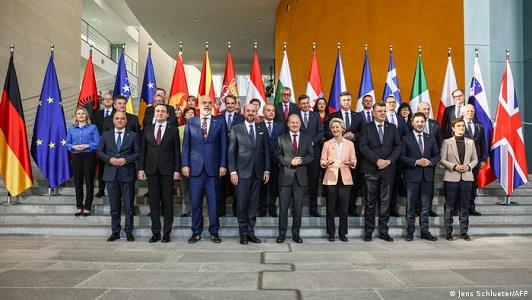Western Balkan Summit 2022 of the Berlin Process
The OECD participated in the Western Balkan Summit 2022 of the Berlin Process, hosted by Germany.
The Berlin Process, initiated in 2014 under German leadership, is an intergovernmental platform with the objective of improving regional co-operation in the Western Balkans and fostering an effective cooperation between the EU and the Western Balkans. It involves eight OECD member countries (Austria, France, Germany, Greece, Italy, Poland, Slovenia and the United Kingdom), two OECD accession countries (Bulgaria, Croatia) and the European Union.
The OECD has been involved in the Berlin Process for several years by engaging in the policy dialogue process, providing analytical input and policy advice and by supporting the rotating Presidencies. OECD senior representatives have been regularly participating in, and contributing to, the ministerial meetings and annual summits.
The 2022 Berlin Summit reaffirmed the key role of the Berlin Process as a driver of regional cooperation and accelerator of the EU integration process. The discussions took stock of progress, ongoing challenges and prospects for regional cooperation in the Western Balkans, with a focus on the Common Regional Market. Considering the implications of the Russian aggression against Ukraine, energy security and green transition was also at the top of the Summit’s agenda.
Leaders’ Meeting - 3 November 2022
|
|
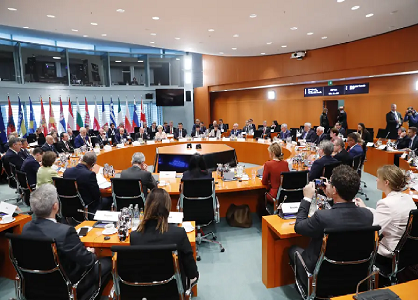 |
Acting Head of the OECD South East Europe Regional Programme, Anita Richter, participated at the Berlin Process 2022 Western Balkans Leaders’ Meeting that was held in Berlin on November 3rd.
The event was chaired by German Chancellor, Olaf Scholz, and brought together the heads of states from the Western Balkans, representatives of the participating EU countries and the UK, as well as international financial institutions and regional organisations.
At the Summit, the leaders of the Western Balkan economies signed three regional mobility agreements, deepening the intra-regional economic integration. The agreements, prepared as part of the Common Regional Market, comprise travel with identity cards within the region, recognition of higher education qualifications, and recognition of professional qualifications for doctors, dentists and architects.
Moreover, the Western Balkan leaders have endorsed a declaration on clean energy and green transition, committing to stepping-up their efforts to implement the Green Agenda for the Western Balkans. The OECD’s support to the Western Balkans in the form of policy analysis and advice on green transition, notably through its flagship publications Competitiveness Outlook and SME Policy Index, have also been acknowledged in the declaration.
Complementing this declaration, the European Commission announced its energy support package of EUR 1 billion in grants to help the region address the immediate consequences of the energy crisis and build resilience.
The participants stressed the continued importance of the Berlin Process to harness the full potential of improved and inclusive regional cooperation, and agreed that the next Berlin Process Summit 2023 would be held in Albania.
Meeting of Energy Ministers - 24 October 2022
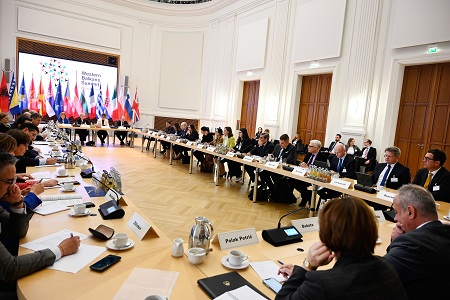 |
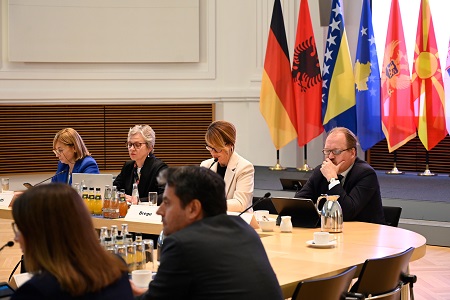 |
In the run-up to the Leaders' Meeting, the Ministers of Energy Meeting, hosted by Dr. Robert Habek, Federal Minister for Economic Affairs and Climate Action of Germany, took place in Berlin on October 24th. It brought together Ministers of Energy and Economy from the Western Balkans and participating EU countries, as well as participants from international and regional organisations and the German private sector.
Director of the OECD Global Relations and Co-operation, Andreas Schaal, outlined the evidence-based policy solutions for the region’s governments to decrease their dependence on fossil fuels by accelerating investment in renewables. Drawing on key findings of the OECD’s Competitiveness Outlook 2021 report, he underscored the need for further streamlining and simplifying the administrative procedures for authorisation, permitting and licensing to invest in renewables. He then added that a supportive framework for renewables needs to be established through the introduction of targeted incentives and support mechanisms, ranging from auctions to compensation tools such as net metering and net billing. He then concluded by encouraging the region’s governments to scale up regional energy integration and co-operation, as it would boost competition and foster investment in renewables through economic of scale.
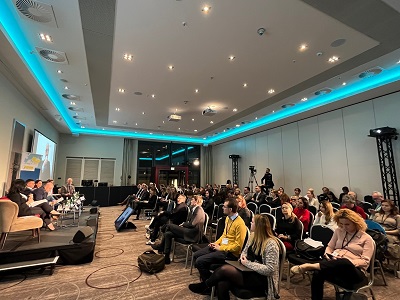 |
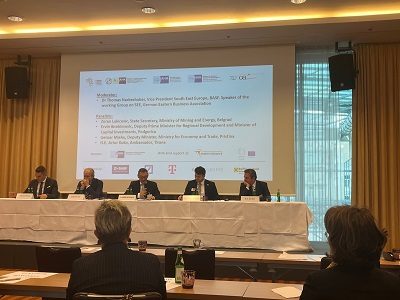 |
In addition, the OECD team has also taken part in the Berlin Process German-Western Balkans Business Forum and Berlin Process Civil Society and Think Tank Conference, which took place on 25 October and 1-2 November respectively in Berlin. These events aimed to promote local ownership of policy discussions of the Berlin Process, by hearing the voice of the civil society and business community on how to strengthen regional co-operation and facilitate green transition in the Western Balkans.
Further information
- Berlin Process website
- Chair’s Conclusions
- Energy Declaration and Support Statements
- OECD South East Europe Competitiveness Outlook 2021
- OECD SME Policy Index 2022: Western Balkans and Turkey
- OECD Background note on "Clean Energy Transition in the Western Balkans”, prepared for the Berlin Process Summit
- Previous Western Balkan Summits (2021, 2019)
Related Documents


